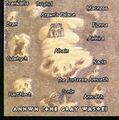Arawn
| Arawn | ||
|---|---|---|
| 2E: Warrior's skull 5E: Black star on a gray background |
||
| Aliases | The Dark One | |
| Alignment | Neutral Evil | |
| Divine Rank | Intermediate God | |
| Pantheon | Celtic | |
| Portfolio | Life and death | |
| Domains | Death, Life | |
| Home Plane | Annwn (Hades) | |
| Worshippers | Gravekeepers, necromancers | |
| Favoured Weapon | Club | |

Arawn is the Celtic god of life and death. He dwells in Annwn, the Ten Isles of the Cursed, in the second layer of Hades. He appears as a regular man with very deep set and dark features, wearing a black robe.
Despite being Neutral Evil, he considers himself a necessary evil to preserve and maintain goodness, for "good cannot shine as bright without evil". He also often intervenes whenever someone attempts to resurrect another person, either sending an avatar to forcefully reclaim the soul, or bargaining to replace the resurrected with a similiar soul. He rewards loyalty and steadfastness, and punishes liars and those lacking cunning with harsh but fair justice.
-
Arawn's realm of Annwn
-
Another look at Annwn
Ravenloft[edit | edit source]
| Arawn | ||
|---|---|---|
| Skull wearing an antlered helm | ||
| Alignment | Neutral Evil | |
| Divine Rank | Unknown | |
| Pantheon | Ravenloft | |
| Portfolio | Death, the underworld | |
| Domains | Death, Evil, Repose | |
| Home Plane | Demiplane of Dread | |
| Worshippers | Goblyns | |
| Favoured Weapon | Scythe | |
In Ravenloft, the worship of Arawn is similiar among humans in Forlorn and Tepest, but the goblyns of Forlorn acknowledge him as their only god.
The goblyns of Forlorn believe that all killing and bloodshed glorifies their god, and killing swells his kingdoms size. They are happy to mindlessly slaughter anyone and anything that they see and throw themselves to gory deaths. Undeath, resurrection, and reincarnation are abhorrent to them, as they believe this to rob Arawn of subjects. The entrance to Annwn, the Isle of the Cursed, the realm of their god, is believed to lie in the Maw of Arawn, fissure at the top of Mt. Arawn (have we said Arawn enough times yet?).
To the Forfarians and Tepestani, Arawn is the seldom-mentioned and feared god, goddess in Tepest, of death, often placated through sacrifices.
| The Deities & Religions of Ravenloft | |||
|---|---|---|---|
| Lawful | Neutral | Chaotic | |
| Good | Brigantia • Ezra (Pure Hearts) • The Overseer • Ra | Andral • Belenus • Diancecht • Osiris | Daghda • The Morninglord • Tvashtri |
| Neutral | Divinity of Mankind • Manannan mac Lir • Ezra (Home Faith) • Yutow | Ancestral Fey • Ezra (Erudites) • Hala • The Ancestral Choir | Lugh • Mytteri |
| Evil | Anubis • Ezra (Zealots) • Math Mathonwy • The Lawgiver • Set • Zhakata | Arawn • The Eternal Order | Cat Lord • Erlin • Kali • Morrigan • The Spider Queen • The Wolf God |
| Unknown | Dark Powers | ||

